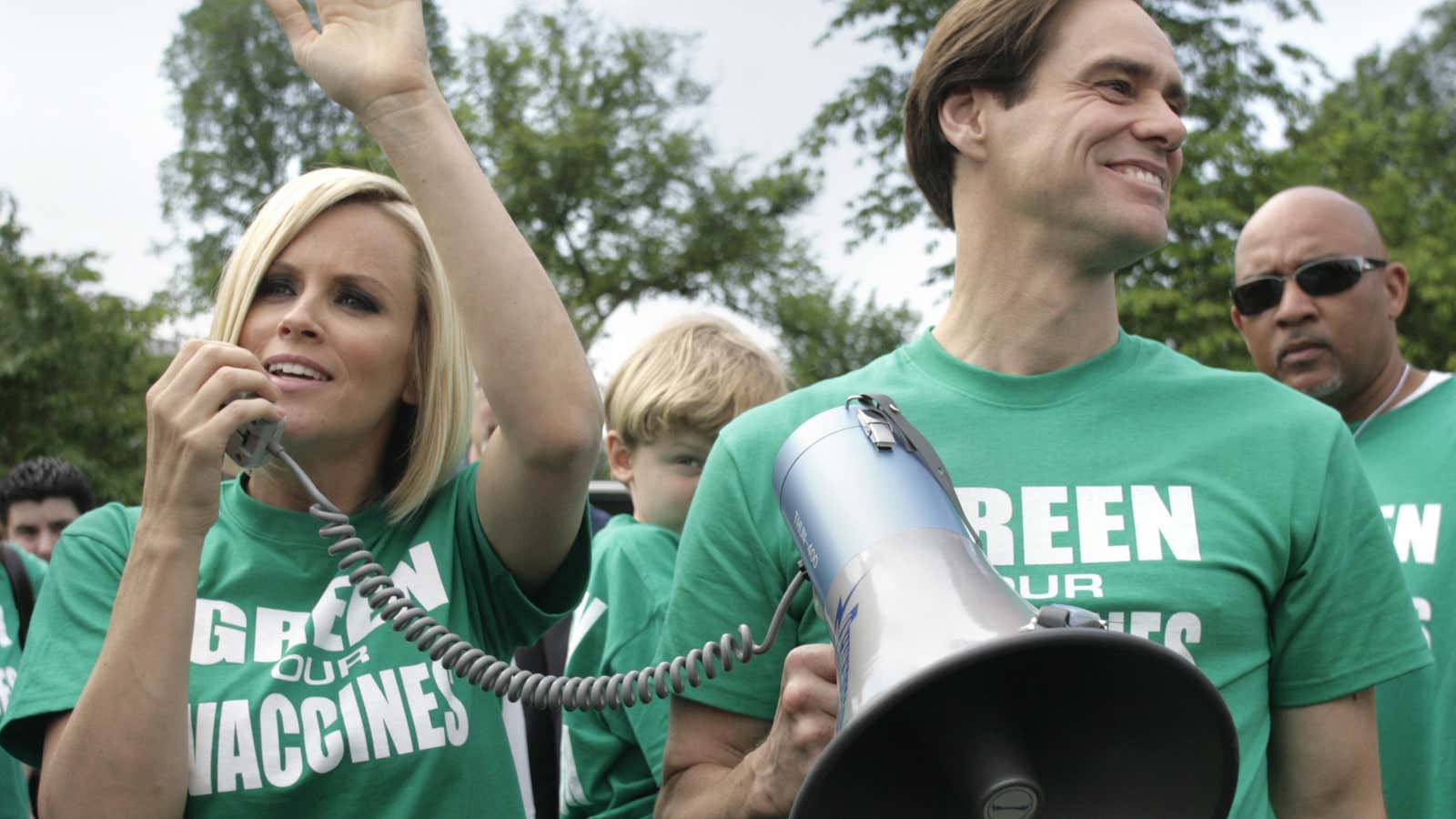I still remember the first article I ever wrote about growing up with Asperger’s Syndrome. It was compelled (I’m reluctant to say inspired) by some of the controversial reports that circulated after the Sandy Hook Elementary School shooting claiming gunman Adam Lanza had an autism spectrum disorder. Two years later, confusion and misinformation about autism continues to thrive, most recently as part of the ongoing debate over mandatory vaccinations in the United States. While the debate has been become a highly polarized, not to mention politicized, topic of discussion, the question I hear the most from readers is one that those engaged in the debate rarely address: When anti-vaccination activists blame inoculations for childhood autism, what message are they sending to the autistic community?
The most obvious message of course is that they haven’t done their research. If they had, they would know that popular arguments connecting autism to vaccination can almost all be traced back to a discredited paper by British medical researcher Andrew Wakefield in 1998. That said, while the existential perils of the anti-vaccination movement threaten autistics and non-autistics alike (see the recent measles outbreak), autistics have had to watch as their condition is once again characterized as a shameful burden. Although there are many individuals with severe forms of autism (e.g., non-verbal, pointedly anti-social, etc.), there are millions of others who are able to lead functional and even happy lives. When anti-vaccination advocates act like their condition is a scourge, they reinforce stereotypes that make it harder for them to take pride in who they are.
I realize it may seem strange to take pride in being autistic, but I’m not alone in this assertion. Indeed, there are already many activists encouraging individuals on the spectrum to do exactly that. In an interview about the PBS documentary “Neurotypical” (a reference to the term used by many autistics to refer to non-autistics), director Adam Larsen explained how “many folks with Aspergers and autism, they don’t want to be cured. They’re very comfortable with their way of thinking and their way of being.” Meanwhile websites like the Institute for the Study of the Neurologically Typical are going one step further by satirizing the notion that neurotypicals, known by some as NTs, should be viewed as the norm. “When in groups NTs are socially and behaviorally rigid, and frequently insist upon the performance of dysfunctional, destructive, and even impossible rituals as a way of maintaining group identity,” the website explains in a tongue-in-cheek fashion. “NTs find it difficult to communicate directly, and have a much higher incidence of lying as compared to persons on the autistic spectrum.”
If the above description seems harsh, it’s only because this type of judgmental language is actually a direct and purposeful reflection of how autistic people are regularly perceived by the rest of society. Autistics often struggle with basic social skills like interpreting nonverbal cues or implicitly understanding widely-recognized rules of etiquette, meaning they are far too often branded as rude or antisocial by those around them. Similarly, because autistics tend to have highly specialized interests and idiosyncratic personality traits, they tend to experience disproportionate adversity when trying to develop meaningful interpersonal connections, instead encountering isolation, rejection, and outright hostility throughout their lives. Just as experts point out that autistics are capable of leading happy and successful lives if given the right opportunities and support, so too will autistics tell me tell you that the biggest obstacle we face is lack of understanding from neurotypicals.
As our culture gradually develops a more sophisticated awareness of the human mind, it becomes increasingly possible that autism will one day be viewed in the same way that the enlightened world is starting to perceive homosexuality today – that is, as an innocuous stamp of a person’s individual biology, on par with one’s fingerprint designs or eye color. Considering that we’re already preparing for an impending ‘autism tsunami’ (thanks to the growing number of autistic children and adults who are able to receive an official diagnosis), such a paradigmatic shift in our cultural perspective couldn’t come at a better time.
None of this is intended to diminish the concerns of parents who want what’s best for their children. “Like many expectant mothers, I felt quite vulnerable when I was pregnant,” wrote social pundit Liskula Cohen, a close friend and frequent collaborator who is pro-vaccination. “Consequently, when a friend who’d had triplets told me that she blamed vaccines for causing one of her daughters to became autistic while her two sisters did not, I became afraid.” An ex-girlfriend echoed these thoughts in her response to a recent article in which I argued for mandatory vaccinations, pointing out that I wasn’t taking being sensitive “the weight of making the decision for your child.”
Because these parental concerns are valid, the “anti-vaxxers” who inflame them are guilty of more than simply endangering innocent lives. That’s why, when hold up autism as a dysfunction to be feared and mourned, they insult all of us on the spectrum. Everyone – neurotypical and autistic alike – deserves better.
